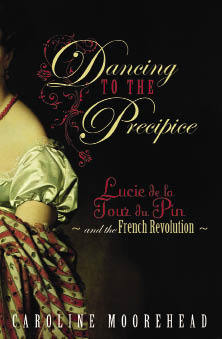Madame de la Tour du Pin’s Journal d’une Femme de Cinquante Ans, with its vivid descriptions of her experiences during the French Revolution and the Napoleonic Empire, is one of the most enthralling memoirs of the age: a hard act, one would think, for a biographer to follow. Caroline Moorehead succeeds in doing so triumphantly in a rich and satisfying book which not only adds to our appreciation of her story but brings the whole tumultuous period and its characters to life.
Born in 1770 into the highest reaches of the French nobility, Lucie-Henriette Dillon spent a lonely and unhappy childhood, brought up by a tyrannical grandmother after her mother’s death when she was 12. Although she was heiress to a great fortune, she knew she faced banishment to a convent if she displeased her grandmother; forced to dissimulate, she learnt the importance of keeping her own counsel very early. Later, as a lady-in-waiting to Marie Antoinette, she observed the corruption of the court with the same privately judgemental eye. Not beautiful — her nose was too long, she noted — but lively and attractive, she was saved from amourous intrigues by her devotion to her husband, Frédéric de Gourvernet, later Marquis de la Tour du Pin. It was a marriage ‘made in heaven’, unshaken through all the trials to come.
Caroline Moorehead brilliantly evokes the douceur de vivre of aristocratic life before the Revolution, the ferment of new ideas, the hopes for reform sparked off by the example of America. But she also shows the fissures beneath the surface, the poverty, unemployment and rising groundswell of unrest. Nineteen years old, and caught up in the pleasures of Versailles, Lucie felt no concern about the future. ‘We were laughing and dancing our way to the precipice’, she wrote.
Lucie’s husband was one of those liberal aristocrats who welcomed the early stages of the Revolution, hoping for a constitutional monarchy along British lines. The onset of the Terror, and the execution of the King in January 1793, saw the ruin of his hopes. For a while he and Lucie took refuge in their family home near Bordeaux. But the arrival of the guillotine in the city in October 1793 drove them into hiding — Lucie, with her small son and newborn baby in cramped rooms near the centre from which she could hear the daily thud of the executions, her husband in a series of perilous hiding places outside. The story of their escape to America, thanks to the help of Thérésia Cabarrus, the mistress of the revolutionary commissioner Tallien, is one of the most thrilling episodes in the book.
The American interlude that followed had its idyllic side, as she and her husband settled to farming near Albany, Lucie chopping wood and milking cows, making friends with the local Indians and taking her own butter, stamped with the family crest, to market. One of their last acts before leaving America after the death of Robespierre was to free their own slaves.
A second exile awaited them after their return to France when they were forced to flee to England, following an anti-royalist witch hunt in 1797. Lucie kept the family by sewing and mending, skills learnt from the servants in her lonely childhood. It was only with the arrival of Bonaparte as First Consul that they were able to return and retrieve the remnants of their fortune. During the great days of the Empire Frédéric served the Emperor faithfully as Prefect in Brussels, only to fall into disfavour and be saved from disgrace by his wife’s courageous intervention.
Lucie’s memoirs stop short on the eve of Waterloo. She lived on till 1853 and Caroline Moorehead draws on her still unpublished correspondence in following the rest of her life. Far from being an anti-climax, it is a story of continuing dramas, including the death of one son in a duel, another’s involvement in the failed coup of the Duchesse de Berri, and her husband’s imprisonment (which she insisted on sharing) as a consequence. Her memoirs, originally written for her family, were published by her great grandson in 1907. They have never been out of print since then.





Comments